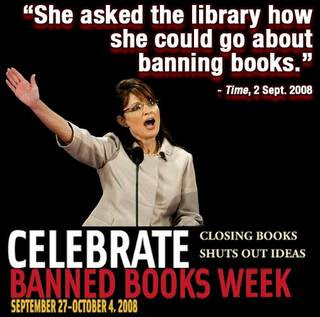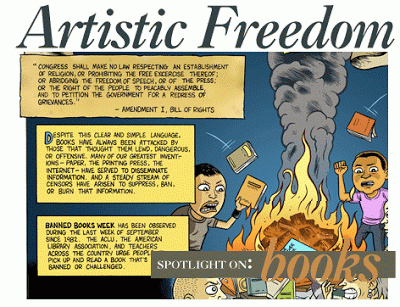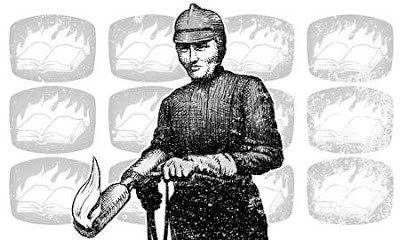
September 27 – October 4, 2008. . .
Banned Books Week: Celebrating the Freedom to Read!
See ‘Burn, Baby, Burn: On “Fahrenheit 451” and why good democracy should make you feel bad’ by Josh Rosenblatt, Below.
Banned Books Week is the only national celebration of the freedom to read. It was launched in 1982 in response to a sudden surge in the number of challenges to books in schools, bookstores and libraries. More than a thousand books have been challenged since 1982. The challenges have occurred in every state and in hundreds of communities. People challenge books that they say are too sexual or too violent. They object to profanity and slang, and protest against offensive portrayals of racial or religious groups–or positive portrayals of homosexuals. Their targets range from books that explore the latest problems to classic and beloved works of American literature.
According to the American Library Association, more than 400 books were challenged in 2007. The 10 most challenged titles were:
1. And Tango Makes Three by Justin Richardson and Peter Parnell
2. The Chocolate War by Robert Cormier
3. Olive’s Ocean by Kevin Henkes
4. The Golden Compass by Philip Pullman
5. The Adventures of Huckleberry Finn by Mark Twain
6. The Color Purple by Alice Walker
7. TTYL by Lauren Myracle
8. I Know Why the Caged Bird Sings by Maya Angelou
9. It’s Perfectly Normal by Robie Harris
10. The Perks of Being a Wallflower by Stephen Chbosky
(Click here to see why these books were challenged.)
During the last week of September every year, hundreds of libraries and bookstores around the country draw attention to the problem of censorship by mounting displays of challenged books and hosting a variety of events. The 2008 celebration of Banned Books Week will be held from September 27 through October 4.
Banned Books Week is sponsored by the American Library Association, the American Booksellers Foundation for Free Expression, the Association of American Publishers, the American Society of Journalists and Authors, and the National Association of College Stores. Banned Books Week is also endorsed by the Center for the Book of the Library of Congress.
Thank you for celebrating Banned Books Week!
Source / Banned Books Week
Burn, Baby, Burn
On ‘Fahrenheit 451’ and why good democracy should make you feel bad
By Josh Rosenblatt / September 26, 2008Illustration by Kevin Peake / Austin Chronicle
When I was 12 years old, word came down that the Montgomery County School Board had decided to ban a book called Amos Fortune: Free Man from all school libraries. They claimed the biography of an African prince turned slave was too controversial and culturally insensitive to be forced upon (or even made available to) the minds of impressionable children, too accurate a portrayal of the darkest chapter in American history to be taught in American schools. African princes are snatched from their villages, the banners cried, and forced into slavery! The book contains the word “nigger,” they warned. Not once, but many, many times! All across suburban Maryland, you could hear the sighs of parents who until that point had never heard of Amos Fortune: Free Man but who could now sleep soundly knowing their kids wouldn’t be coming around asking them uncomfortable questions about it.The next day, I went out and bought myself a copy of Amos Fortune: Free Man and, with all the brazenness of early adolescence, took it to school to read during English class. I was convinced that within those pages resided a tale of such decadence, such lasciviousness, such utter degradation and human calamity as to make my hair stand on end, my knees buckle, and my soul curdle. Why else would adults be banning it?
Turns out I had gotten my hopes up for nothing: The Amos Fortune affair, rather than being my introduction to a world of controversy and open defiance, would mark instead the beginning of my realization that adults had no idea what they were talking about. I read every page of that book and discovered nothing even remotely scandalous. There were scenes of violence and racism, of course, but anyone who had made it to the seventh grade knew what slavery was and was cognizant of the fact that those subjected to it had lived lives of unaccountable misery. Nothing new there. So why had they banned Amos Fortune, when I found nothing there to differentiate it from any number of morality tales about the value of hard work and charitable living shoved daily down the throats of American students from Maine to California?
It was then I began to realize that some people will try to ban anything, regardless of its artistic merit, its cultural status, or even its ability to titillate or warp young minds. Some people will try to ban things simply because they think banning things is a good and noble way to spend one’s time … because someone’s got to keep an eye out!
The whole fiasco left me terrified of the fragility of American liberty and ashamed of the prudishness of American culture, a feeling that has never gone away.
A curious (and very partial) list of books that have been banned, challenged, or redacted by government and/or school officials in the United States:
The Adventures of Tom Sawyer, The Canterbury Tales, The Diary of Anne Frank, Of Mice and Men, The Life and Works of Renoir, Little House on the Prairie, The Rolling Stone Illustrated History of Rock & Roll, To Kill a Mockingbird, The What’s Happening to My Body? Book for Girls: A Growing Up Guide for Parents and Daughters, The What’s Happening to My Body? Book for Boys: A Growing Up Guide for Parents and Sons, the Bible, Where’s Waldo?
“Books make people unhappy.”
This line comes from François Truffaut’s adaptation of Ray Bradbury’s 1953 sci-fi classic, Fahrenheit 451, about a dystopian future society where reading has been outlawed and books are burned in the streets. Newspaper comic strips are cartoons devoid of words. Human beings rely on impossibly vapid television shows for their senses of identity and purpose (Bradbury has said that his main motivation for writing the book wasn’t concern over censorship but rather fear that television was destroying people’s interest in reading). The written word is dead.
The Captain, played by Cyril Cusack, speaks that line while explaining to the film’s hero, Guy Montag (Oskar Werner), why it’s necessary that they and their fellow firemen burn books. The firemen, after all, are the best line of defense against the reading scourge; without their ability to suss out suspected readers, the America they live in – a land of drugged-up housewives and automaton husbands – would fall prey to critical thought and individuality, resulting in self-absorption, moral relativism, and societal collapse.
The frightening thing, of course, is that the Captain’s observation isn’t entirely wrong. After all, it’s a fool who sees a correlation between happiness and intimate knowledge of the psychological motives behind Raskolnikov’s axing the pawnbroker woman in Crime and Punishment, between happiness and knowing exactly how many hundreds of thousands of Rwandans were hacked to death in 1994, between happiness and the awareness of the perilously slim and shrinking lead Barack Obama has in the current presidential election.
But isn’t that what makes American democracy so fascinating? Any society can advocate the pursuit of happiness, but it takes an especially confident one to allow its citizens the right to pursue the opposite. Despair, worthless empathy, artistic immersion are the dread of others. Unhappiness. True democracy lies in a society resigning itself to the great multiplicity of human emotion and behavior. If anything, liberty should be making us all miserable.
Truffaut, ever the Frenchman, understood this paradox as well as anyone, and with Fahrenheit 451, he created a cinematic world that celebrates the variety of human experience even as it condemns viewers to the unvaried confines of authoritarianism.
Truffaut found just the right housing slabs to film at just the right point in gray, leafless late autumn to capture the pervading sense of lifelessness compulsory to any dystopian movie. And yet, at the same time, Fahrenheit 451 is the first movie the director ever shot in color – glorious Technicolor, to be exact – and he couldn’t resist shooting it as if it were some kind of carnival fun house, a world bursting with colors that both thrill viewers and sicken them with saturation.Witness the director’s ironic, almost cartoonish use of green-screen backgrounds. It was the most blatant and unapologetically artificial manipulation since Hitchcock (his hero), brazen in its acknowledgement of the pure contrivance that is cinematic storytelling. It’s a technique that pays tribute to the wonder of film while acting as the perfect visual parallel to Bradbury’s condemnation of ersatz broadcast reality and its detrimental effects on the human mind, on human emotion, and on human society.
It’s film honoring film and condemning it at the same time.
A curious (and partial) list of movies that have been banned by government officials, Hollywood Production Code administrators, and/or Catholic League of Decency members in the United States (with explanations):
The Birth of a Nation (racism), The Tin Drum (underage sex), The Last Temptation of Christ (blasphemy), Scarface (violence), Frankenstein (cruelty), The Moon Is Blue (existence of female sexuality), The Outlaw (existence of Jane Russell’s breasts).
Every year, the American Library Association pays tribute to the lunacy of censorship by organizing events all over the country for Banned Books Week. In Chicago, for example, there’s the Read-Out! celebration, where authors and other celebrities recite passages from their favorite banned and challenged books. In Encino, Calif., students at the Valley Beth Shalom Day School will be taken to the school library and invited to explore banned books to see what all the fuss is about (I don’t envy them their inevitable disappointment). Even the virtual world of Second Life is staging an event.
Source / Austin Chronicle



















Thorne, I’m absolutely delighted you posted this.
You can type in banned books on Google; get the list, and even read some of them ‘on line’. Thanks to a good friend of mine who agrees with you; me, and thousands of others, we’ve shared links to sources where we can read part (or all) of many of the books that you gave a partial list for.
If a person wants to ‘ban’ a book, they don’t have to buy it or read it. To me, it’s like saying, ‘ban education’ – ‘ban learning’ – ‘ban understanding’, and by ‘banning’ all of this we wind up with the very problems that face our country today!
It’s ‘okay’ to have violent video games that sell for top dollar; over and over, these games involve killing; invoke anger and hate – nothing but destruction, and NO ONE IS BANNING this!
Television is riddled with crime; punishment – death, brutality – even extortion/drug smuggling/abuse/every kind of violence against the human being, animals – in all aspects of evil, television portrays this for all the world to see. But, nothing is banned – and there are parental controls for the I-net and television, so the same should be invoked as it pertains to books – ‘parental controls’. Once the child has grown, let the grown person decide.
We are fed propaganda about other countries and their governments and way of life; we are brain-washed to believe that America is the ‘only way’. I believe they attempt to ban books to avoid us learning the TRUTH about how others in this world view life; what they see as a certain truth, and how they validate and justify what we do. If we ignore this; if it is banned, then we are not able to truly make independent decisions and conclusions – each person coming to that conclusion without having had limits put on their ability to get the information that’s vitally needed.
In this land of so-called ‘freedom’, I’ve seen more and more attempts to limit our freedoms in the 66 years I’ve been alive.
As to some of those books, having been an avid reader and also having read many of those on the ‘banned list’, I can’t understand their reasoning because those books have educated me and allowed me to be more informed about what I need to do and how I see the rights and plight of others in this world.
I do hope your readers will make an effort to get the complete list of banned books and also take the time to read some of them. /ds
By the way, this link will give you the A-Z list, and a brief summary of why they’ve been banned.
This is the best list I could find; it augments the 10 most banned books….
http://www.abffe.com/bbw-booklist-detailed.htm
It was extremely interesting for me to read the article. Thanks for it. I like such topics and anything that is connected to this matter. I would like to read more on that blog soon.